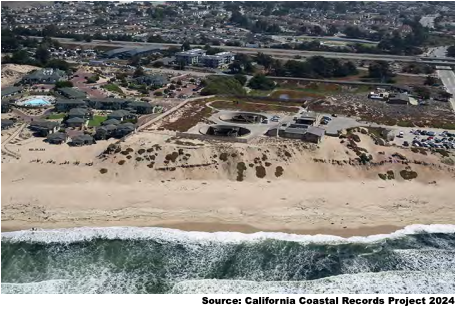Summary
The Commission approved Marina’s proposed Local Coastal Program (LCP) amendment—an ambitious and forward-thinking effort to protect the city’s largely undeveloped shoreline from sea level rise and coastal hazards. The amendment establishes a new Coastal Hazards and Sea Level Rise chapter that requires new development to be carefully sited and designed to avoid reliance on shoreline armoring, now and in the future. It also introduces a robust suite of tools—technical studies, deed restrictions, real estate disclosures, bonding, and coastal hazard response plans—to ensure development remains resilient while keeping Marina’s beaches open, unarmored, and accessible to all.
While the City originally proposed a complete ban on shoreline armoring, Commission staff recommended modifications to ensure consistency with Section 30235 of the Coastal Act, which allows armoring in limited circumstances to protect certain pre-1977 structures, public beaches, and coastal-dependent uses. The City asked the Commission to approve their draft as submitted, but also agreed to accept staff’s accepted modifications if necessary. The Commissioners ultimately agreed with their staff, acknowledging that while actual armoring along Marina’s shoreline is unlikely, the law requires maintaining the option under narrowly defined conditions. Therefore, they approved the amendment with staff’s suggested modifications. The Commission’s approval—reflecting this balance—upholds the amendment’s core goals of long-term coastal resilience and resource protection while ensuring legal consistency with the Coastal Act.
In the end, the Marina LCP update stands out as a model for proactive coastal planning and collaboration. It aligns closely with the Commission’s 2015 Sea Level Rise Policy Guidance, embraces best practices such as adaptive management and hazard disclosure, and reaffirms Marina’s commitment to science-based, community-centered coastal stewardship. The City and Commission staff worked closely and constructively throughout the process, demonstrating that innovative and legally sound coastal protection can go hand in hand.

Why You Should Care
Marina’s LCP update sets a new standard for how local governments can protect their coastline now and into the future—especially in communities where the shoreline remains largely undeveloped. Unlike some cities that request neighborhood-scale seawall carveouts or shy away from the idea of “managed retreat,” Marina has fully embraced retreat as the only reliable way to preserve the coastline that defines their community and keeps beaches open to all.
It is ironic—but not surprising—that the Commission added language limiting the City’s shoreline armoring ban to ensure consistency with Coastal Act Section 30235. While an LCP can be more protective than the Coastal Act, it cannot be inconsistent with it. Section 30235 requires shoreline protective devices in certain narrowly defined circumstances, and that language cannot be overridden in a local plan. A legislative update to Section 30235 could, however, further restrict when armoring is allowed—helping ensure California’s beaches and coastlines are better preserved for generations to come.
Outcome
Pro-Coast Vote
Anti-Coast Vote
Organizations Opposed
Decision Type
Local Coastal Program Amendment
Staff Recommendation
Approve with modifications



